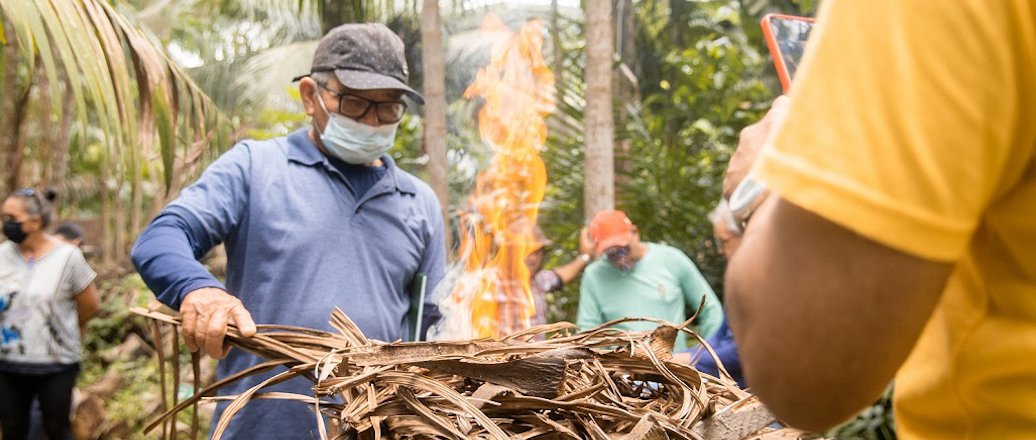The Ativa Barcarena project promoted the course “Soil Health and Agroecological Practices” for family farmers in the region of Barcarena, in partnership with the Juquira Candiru Satyagraha (JCS) network. During two days, 32 participants learned to analyze the soil using the “Pfeiffer Chromatography” technique, a tool capable of revealing fertility in a broad and multidimensional way.
In addition to the project's recipients, three technicians from the Municipal Agriculture Department (Semagri) and the Ativa Barcarena team attended the course, which had content and methodology proposed by Juquira Candiru and the Peabiru Institute. The classes also brought techniques on the production and use of glass water and charcoal for substrate, natural seed pelleting for storage and planting, as well as agroecological recipes for pest and disease control. Aimed at farmers and technicians interested in the subject, the practices can and should be adapted to each territory and, mainly, to the resources available in each productive reality.
The senior manager of socio-environmental programs at Hydro, Rachel Starling, reinforces that Ativa Barcarena will contribute to the sustainable and permanent development of an agri-food system for the region of Barcarena. “Based on the strengthening of family farming, networking, public-private partnerships and the discussion of local public policies, we reinforce the company's care and collaboration with its investments in social development, seeking to be a good neighbor, supporting local economies and facilitating knowledge”, he highlights.
For Flora Bittencourt, manager of the Ativa Barcarena project by Peabiru, it is important to encourage the use of agroecological techniques and reduce or end the use of toxic agrochemicals in the region. “We must encourage agricultural practices that respect ecosystem cycles and all beings involved, including the farmer and the final consumer, for the production of healthy and safe food for consumption. By favoring the use of local resources in the maintenance of crops and livestock, it is possible to reduce financial investments with the purchase of inputs and equipment and, at the same time, encourage the formation of networks between farmers with the same interests and/or facing the same challenges”, highlights Flora.
The Ativa Barcarena project is organized by Hydro and carried out by the Peabiru Institute, in Barcarena, northeast of Pará, since 2018 and values family farming and sustainable food production with the aim of promoting the development of a local agri-food system. Currently, the project provides technical assistance to 91 farming families, but since the beginning of activities, 392 farming families have participated, resulting in 1,568 people directly and indirectly benefiting from the actions carried out. For the 2022 course, the partnership was reinforced by the articulation with Juquira Candiru, which works with a focus on peasant ecological agriculture and is a reference in topics related to family farming. In 2018, the JCS team offered the “Agroecological Firefighter” course to family farmers benefiting from the Ativa Barcarena project, in addition to some students, technicians and teachers in Pará.
: July 29, 2022







